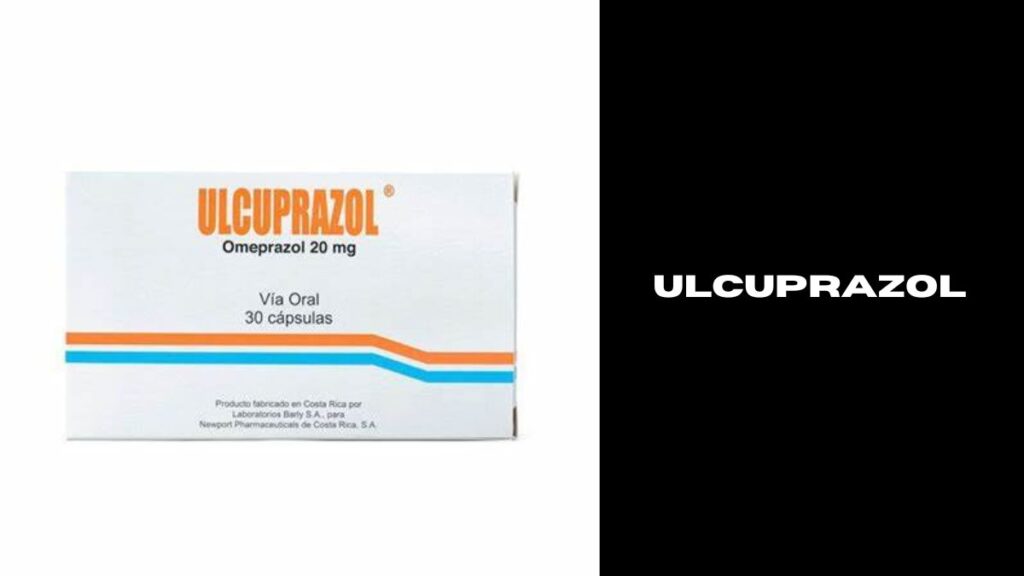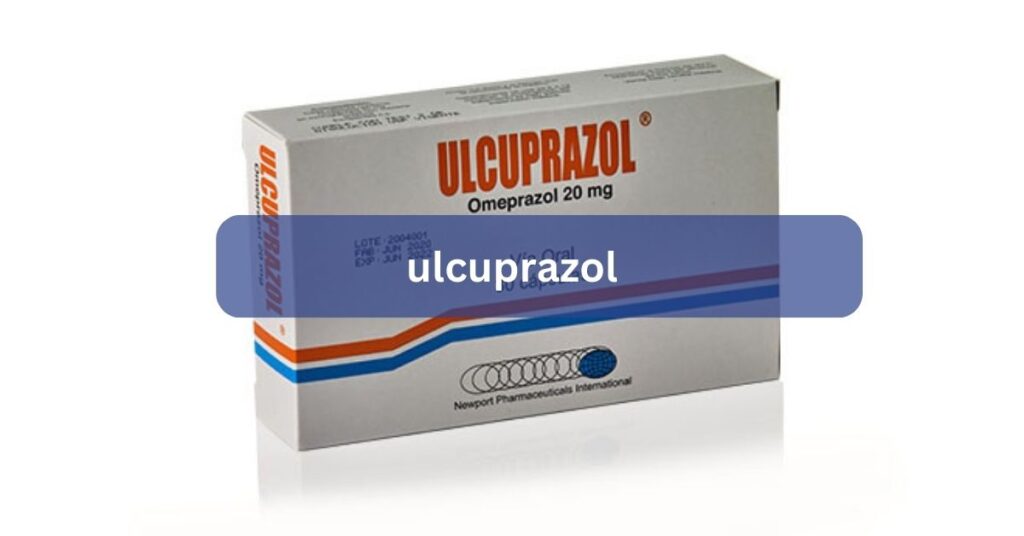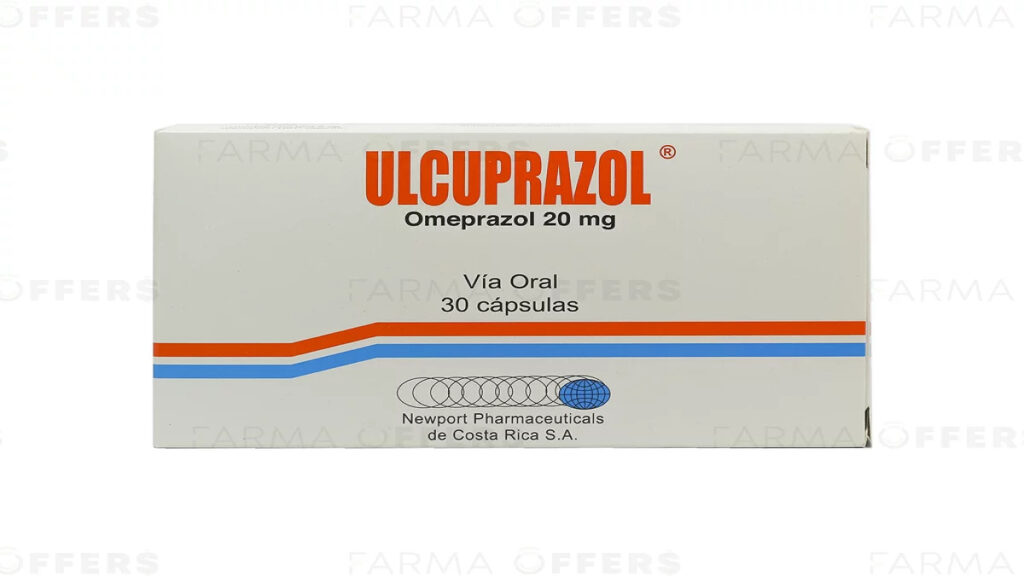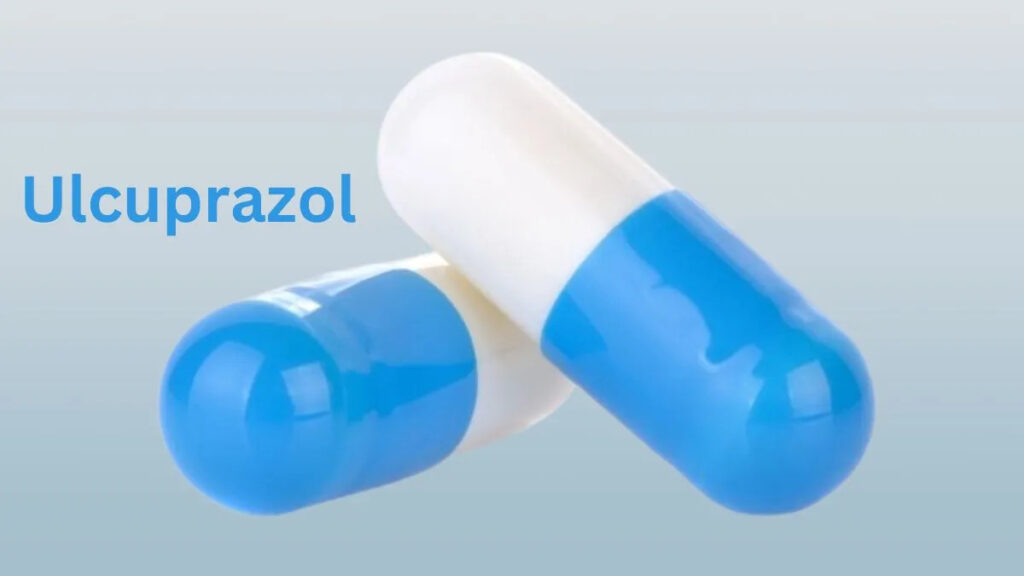Introduction to Ulcuprazol
Ulcuprazol is a proton pump inhibitor (PPI) medication renowned for its efficacy in treating various gastrointestinal conditions. This pharmaceutical marvel is a cornerstone in the management of acid-related disorders such as acid reflux, stomach ulcers, and Zollinger-Ellison syndrome. By targeting the proton pump in the stomach’s parietal cells, Ulcuprazol effectively reduces gastric acid secretion, alleviating symptoms and promoting healing.
Ulcuprazol’s mechanism of action involves the inhibition of the H+/K+ ATPase enzyme system in the gastric parietal cells, thereby blocking the final step of acid production. This results in a significant reduction in gastric acid secretion, which plays a pivotal role in the pathogenesis of acid-related disorders. By modulating gastric acidity, Ulcuprazol provides relief from symptoms such as heartburn, regurgitation, abdominal pain, and nausea, allowing individuals to regain comfort and improve their quality of life.
Moreover, Ulcuprazol boasts not only symptomatic relief but also a remarkable ability to promote healing of gastric ulcers and erosions. By creating a less acidic environment within the stomach, Ulcuprazol accelerates the repair and regeneration of damaged gastric mucosa, facilitating the resolution of ulcer-related symptoms and reducing the risk of complications.
In addition to its therapeutic benefits, Ulcuprazol is generally well-tolerated, with a favorable safety profile when used as directed. However, like any medication, it may be associated with potential side effects, including headaches, nausea, diarrhea, and bloating. Therefore, it is essential to use Ulcuprazol under medical supervision to manage potential side effects effectively and ensure optimal treatment outcomes.
Overall, Ulcuprazol stands as a beacon of hope for individuals grappling with gastrointestinal distress, offering relief from symptoms and promoting healing to restore optimal gastrointestinal health and well-being. Its role in the management of acid-related disorders is indispensable, making it a trusted ally in the journey towards digestive wellness.

Rapid Relief from Gastric Discomfort
Ulcuprazol offers swift and effective relief from various forms of gastric discomfort, providing individuals with the comfort they need to go about their daily lives without hindrance. By inhibiting the proton pump in the stomach’s parietal cells, Ulcuprazol reduces the production of gastric acid, which plays a key role in many forms of gastric discomfort. Whether it’s the burning sensation of acid reflux, the gnawing pain of stomach ulcers, or the distressing symptoms of Zollinger-Ellison syndrome, Ulcuprazol acts quickly to alleviate these discomforts and restore a sense of well-being.
In cases of acid reflux, Ulcuprazol helps soothe the inflamed esophageal lining by reducing the acidity of stomach contents that may backflow into the esophagus. This leads to a rapid reduction in symptoms such as heartburn, regurgitation, and chest pain, allowing individuals to find relief from the discomfort associated with this condition.
For those suffering from stomach ulcers, Ulcuprazol accelerates the healing process by creating a less acidic environment within the stomach. This promotes the repair of ulcerated tissues and helps alleviate symptoms such as abdominal pain and bloating. With Ulcuprazol’s rapid action, individuals can experience significant improvements in ulcer symptoms, often within a short period of initiating treatment.
Similarly, individuals diagnosed with Zollinger-Ellison syndrome, characterized by excessive gastric acid secretion due to tumors in the pancreas or duodenum, can find rapid relief from the debilitating symptoms of this condition with Ulcuprazol. By effectively controlling acid production, Ulcuprazol helps manage symptoms such as severe abdominal pain, diarrhea, and reflux, allowing individuals to regain comfort and improve their quality of life.
Overall, Ulcuprazol’s ability to provide rapid relief from gastric discomfort makes it an invaluable tool in managing various gastrointestinal conditions. Whether it’s soothing the burning sensation of acid reflux, promoting ulcer healing, or controlling acid hypersecretion in Zollinger-Ellison syndrome, Ulcuprazol empowers individuals to reclaim their gut health and live their lives to the fullest.

Boosting Digestive Resilience
Ulcuprazol not only provides symptomatic relief but also plays a crucial role in boosting digestive resilience, helping individuals better cope with the challenges of maintaining gastrointestinal health. By inhibiting the proton pump in the stomach’s parietal cells, Ulcuprazol reduces the production of gastric acid, which can contribute to various digestive disorders and compromise gut resilience.
In conditions such as acid reflux, excessive gastric acid can weaken the lower esophageal sphincter, allowing acidic stomach contents to reflux into the esophagus, leading to discomfort and inflammation. By lowering gastric acidity, Ulcuprazol helps reduce the frequency and severity of acid reflux episodes, thereby minimizing esophageal irritation and promoting the restoration of normal esophageal function. This enhancement of esophageal resilience allows individuals to better tolerate occasional reflux episodes and reduces the risk of complications such as esophageal ulcers or Barrett’s esophagus.
Similarly, in the context of stomach ulcers, Ulcuprazol promotes digestive resilience by creating an environment conducive to ulcer healing. By decreasing gastric acidity, Ulcuprazol reduces the erosive effects of gastric acid on ulcerated tissues, facilitating the repair and regeneration of the gastric mucosa. This enhancement of gastric resilience not only accelerates ulcer healing but also strengthens the integrity of the stomach lining, reducing the susceptibility to recurrent ulceration and complications such as bleeding or perforation.
Moreover, in individuals with conditions like Zollinger-Ellison syndrome, characterized by excessive gastric acid secretion, Ulcuprazol helps restore digestive resilience by effectively controlling acid hypersecretion. By inhibiting the excessive production of gastric acid, Ulcuprazol mitigates the damaging effects of acid on the gastrointestinal mucosa, thereby reducing the risk of ulceration, erosion, and other complications associated with acid-related disorders.
Overall, Ulcuprazol’s role in boosting digestive resilience goes beyond symptom management, providing individuals with the support they need to maintain optimal gastrointestinal health and function. By addressing underlying factors contributing to digestive disturbances and promoting mucosal healing and integrity, Ulcuprazol empowers individuals to build resilience against digestive challenges and enjoy a higher quality of life.

Fortifying Gut Integrity
Ulcuprazol contributes to the fortification of gut integrity, playing a vital role in preserving the structural and functional integrity of the gastrointestinal tract. By inhibiting the proton pump in the stomach’s parietal cells, Ulcuprazol reduces the secretion of gastric acid, which can compromise gut integrity and lead to various gastrointestinal disorders.
One key aspect of gut integrity is the maintenance of a healthy mucosal barrier lining the gastrointestinal tract. Excessive gastric acid secretion can disrupt this barrier, leading to mucosal damage and increased permeability, commonly referred to as “leaky gut.” Ulcuprazol helps fortify gut integrity by lowering gastric acidity, thereby reducing the erosive effects of acid on the mucosal lining. This preservation of the mucosal barrier enhances its resilience against injury and supports its role in nutrient absorption, immune defense, and protection against harmful pathogens.
Furthermore, Ulcuprazol promotes the healing of gastrointestinal ulcers, which are often associated with compromised gut integrity. By creating a less acidic environment within the stomach, Ulcuprazol accelerates the repair and regeneration of ulcerated tissues, restoring the structural integrity of the gastric mucosa. This enhancement of gut integrity not only alleviates ulcer-related symptoms but also reduces the risk of complications such as bleeding, perforation, or infection, thereby safeguarding overall gastrointestinal health.
Moreover, in conditions characterized by excessive gastric acid secretion, such as Zollinger-Ellison syndrome, Ulcuprazol helps maintain gut integrity by effectively controlling acid hypersecretion. By inhibiting the overproduction of gastric acid, Ulcuprazol mitigates the damaging effects of acid on the gastrointestinal mucosa, preserving its structural integrity and reducing the risk of ulceration, erosion, and other complications associated with acid-related disorders.
In summary, Ulcuprazol’s role in fortifying gut integrity extends beyond symptom management, contributing to the preservation of a healthy gastrointestinal environment. By reducing gastric acidity, promoting ulcer healing, and controlling acid hypersecretion, Ulcuprazol helps protect and strengthen gut integrity, ensuring optimal gastrointestinal function and resilience against digestive disturbances.

Enhancing Gastric Healing
Ulcuprazol serves as a powerful agent in enhancing gastric healing, facilitating the repair and regeneration of damaged gastric tissues to restore optimal gastrointestinal health. Through its mechanism of inhibiting the proton pump in the stomach’s parietal cells, Ulcuprazol reduces the secretion of gastric acid, creating an environment conducive to the healing process.
Gastric healing is a complex biological process involving the repair of damaged mucosal tissues and the restoration of the structural integrity of the gastric mucosa. Excessive gastric acid secretion can compromise this process, leading to the development and persistence of gastric ulcers, erosions, and other mucosal injuries. Ulcuprazol plays a pivotal role in enhancing gastric healing by lowering gastric acidity, which helps alleviate mucosal damage and promotes tissue regeneration.
By reducing gastric acidity, Ulcuprazol minimizes the erosive effects of acid on ulcerated tissues, allowing the natural healing mechanisms of the body to take effect. This includes the formation of new epithelial cells to replace damaged ones, the synthesis of protective mucus to shield the gastric mucosa, and the recruitment of immune cells to facilitate tissue repair and combat infection. Ulcuprazol’s ability to create a less acidic environment within the stomach accelerates these healing processes, leading to faster resolution of gastric ulcers and a restoration of mucosal integrity.
Furthermore, Ulcuprazol promotes angiogenesis, the formation of new blood vessels, which is essential for delivering oxygen and nutrients to the healing gastric tissues. This enhanced blood flow facilitates the transport of essential healing factors and accelerates the removal of cellular debris, further expediting the healing process.
In addition to its direct effects on gastric healing, Ulcuprazol also helps prevent the recurrence of gastric ulcers by maintaining a lower level of gastric acid secretion. By reducing the risk of ulcer reformation, Ulcuprazol supports long-term gastric health and ensures sustained healing benefits for individuals with a history of gastric ulcers.
Overall, Ulcuprazol’s role in enhancing gastric healing is pivotal in the management of various gastric disorders, providing individuals with the support they need to achieve optimal gastrointestinal health and well-being.

Maximizing Gastrointestinal Comfort
Ulcuprazol plays a vital role in maximizing gastrointestinal comfort, offering individuals relief from the discomfort and distress associated with various gastrointestinal conditions. Through its action of inhibiting the proton pump in the stomach’s parietal cells, Ulcuprazol reduces the secretion of gastric acid, addressing the underlying cause of many gastrointestinal symptoms and promoting overall comfort.
One of the primary sources of gastrointestinal discomfort is acid reflux, characterized by the backflow of acidic stomach contents into the esophagus. This can lead to symptoms such as heartburn, regurgitation, chest pain, and difficulty swallowing. Ulcuprazol provides relief by lowering gastric acidity, thereby reducing the frequency and severity of reflux episodes and alleviating associated symptoms. By restoring esophageal pH balance and minimizing esophageal irritation, Ulcuprazol helps individuals experience greater comfort and improved quality of life.
Similarly, Ulcuprazol offers relief from the discomfort of stomach ulcers, which can manifest as abdominal pain, bloating, nausea, and vomiting. By creating a less acidic environment within the stomach, Ulcuprazol helps soothe inflamed gastric mucosa, alleviate ulcer-related symptoms, and promote ulcer healing. This reduction in ulcer-associated discomfort allows individuals to enjoy greater gastrointestinal comfort and resume their daily activities with ease.
Moreover, in conditions characterized by excessive gastric acid secretion, such as Zollinger-Ellison syndrome, Ulcuprazol effectively controls acid hypersecretion and provides relief from symptoms such as severe abdominal pain, diarrhea, and reflux. By inhibiting the overproduction of gastric acid, Ulcuprazol helps individuals manage their symptoms more effectively, improving their overall comfort and well-being.
In addition to its direct effects on symptom relief, Ulcuprazol also helps individuals maximize gastrointestinal comfort by reducing the risk of complications associated with acid-related disorders, such as ulcer bleeding, perforation, or strictures. By maintaining gastric health and integrity, Ulcuprazol supports long-term comfort and ensures sustained relief from gastrointestinal discomfort.
Overall, Ulcuprazol’s role in maximizing gastrointestinal comfort is invaluable, providing individuals with the support they need to alleviate symptoms, improve quality of life, and enjoy greater overall well-being.
Strengthening Acid Control
Ulcuprazol serves as a cornerstone in strengthening acid control, providing individuals with effective management of gastric acid levels to alleviate symptoms and promote gastrointestinal health. Through its mechanism of inhibiting the proton pump in the stomach’s parietal cells, Ulcuprazol effectively reduces the secretion of gastric acid, exerting precise and powerful control over acid levels within the stomach.
Acid control is paramount in managing various gastrointestinal conditions, including acid reflux, stomach ulcers, and Zollinger-Ellison syndrome. In acid reflux, excessive gastric acid can lead to the reflux of acidic contents into the esophagus, causing symptoms such as heartburn, regurgitation, and chest pain. it strengthens acid control by lowering gastric acidity, thereby reducing the frequency and severity of reflux episodes and providing relief from associated symptoms.
Similarly, in stomach ulcers, it enhances acid control by creating a less acidic environment within the stomach, which promotes ulcer healing and alleviates ulcer-related symptoms. By inhibiting acid secretion, it reduces the erosive effects of acid on ulcerated tissues, facilitating the repair and regeneration of the gastric mucosa. This enhancement of acid control not only accelerates ulcer healing but also reduces the risk of ulcer recurrence and complications such as bleeding or perforation.
Moreover, in individuals with Zollinger-Ellison syndrome, characterized by excessive gastric acid secretion due to tumors in the pancreas or duodenum, it provides robust acid control by effectively suppressing acid hypersecretion. By inhibiting the overproduction of gastric acid, it helps individuals manage symptoms such as severe abdominal pain, diarrhea, and reflux, while also reducing the risk of complications associated with acid-related disorders.
In addition to its therapeutic benefits, it role in strengthening acid control extends to prevention, ensuring long-term gastric health and minimizing the risk of acid-related complications. By maintaining precise control over acid levels within the stomach, Ulcuprazol supports optimal gastrointestinal function and provides individuals with the confidence they need to manage their condition effectively.
Overall, it ability to strengthen acid control is fundamental in the management of various gastrointestinal conditions, offering individuals relief from symptoms and promoting overall gastrointestinal health and well-being.

Elevating Digestive Wellness
it plays a pivotal role in elevating digestive wellness, fostering an environment of optimal gastrointestinal health and function. By targeting the proton pump in the stomach’s parietal cells, Ulcuprazol effectively reduces the production of gastric acid, addressing underlying factors that contribute to digestive disturbances and promoting overall digestive well-being.
Digestive wellness encompasses various aspects of gastrointestinal health, including the maintenance of a balanced gut microbiome, the integrity of the gastrointestinal lining, and the regulation of gastric acid secretion. Ulcuprazol contributes to digestive wellness by:
- Balancing Gastric Acidity:Excessive gastric acid production can disrupt the delicate balance of the gastrointestinal environment, leading to symptoms such as acid reflux, stomach ulcers, and gastritis. it helps restore balance by lowering gastric acidity, alleviating symptoms associated with acid-related disorders, and promoting a more harmonious gastrointestinal milieu.
- Supporting Gut Healing: it promotes the healing of gastric ulcers and erosions by creating a less acidic environment within the stomach. By reducing the erosive effects of gastric acid on the gastric mucosa, it facilitates tissue repair and regeneration, enhancing the integrity of the gastrointestinal lining and fostering a healthier gut environment.
- Minimizing Discomfort: Digestive discomfort, such as heartburn, bloating, and abdominal pain, can significantly impact quality of life. it provides relief from these symptoms by reducing gastric acid secretion and alleviating the underlying causes of discomfort, allowing individuals to experience greater digestive comfort and well-being.
- Preventing Complications: Left unmanaged, gastrointestinal conditions such as acid reflux and stomach ulcers can lead to complications such as esophageal strictures, ulcer bleeding, and perforation. Ulcuprazol helps prevent these complications by effectively controlling gastric acid secretion, reducing the risk of ulcer recurrence, and promoting long-term digestive health and wellness.
By addressing these key aspects of digestive wellness, it empowers individuals to achieve optimal gastrointestinal health and function, allowing them to enjoy a life free from digestive discomfort and complications. Through its ability to balance gastric acidity, support gut healing, minimize discomfort, and prevent complications, it serves as a cornerstone in promoting digestive wellness and enhancing overall quality of life.

Shielding Against Gastric Distress
Ulcuprazol acts as a stalwart shield, safeguarding against the debilitating effects of gastric distress and providing individuals with respite from the discomfort and complications associated with various gastrointestinal conditions. By inhibiting the proton pump in the stomach’s parietal cells, it effectively curtails gastric acid secretion, addressing the underlying factors that contribute to gastric distress and bolstering overall gastric resilience and well-being.
Gastric distress encompasses a spectrum of symptoms and disorders, including acid reflux, peptic ulcers, and conditions marked by excessive gastric acid secretion. Ulcuprazol serves as a shield against gastric distress by:
- Mitigating Acid Reflux: Acid reflux, characterized by the regurgitation of stomach contents into the esophagus, can induce symptoms such as heartburn, chest pain, and difficulty swallowing. it diminishes gastric acidity, diminishing the frequency and intensity of reflux episodes and affording relief from associated discomfort, thereby shielding individuals from the distress of acid reflux.
- Facilitating Ulcer Healing: Stomach ulcers, whether gastric or duodenal, provoke abdominal pain, bloating, and in severe cases, bleeding or perforation. it shields against gastric distress by expediting ulcer healing, fostering a less acidic milieu within the stomach conducive to tissue repair and regeneration. This protective action ameliorates ulcer-related symptoms and forestalls complications, shielding individuals from the anguish of ulceration.
- Regulating Acid Secretion: In conditions such as Zollinger-Ellison syndrome, characterized by the hypersecretion of gastric acid due to tumors, itimparts robust protection by modulating acid secretion. By tempering excessive acid production, Ulcuprazol shields against the discomfort and complications attendant to acid hypersecretion, including abdominal pain, diarrhea, and esophageal damage, thereby fortifying individuals against distressing symptoms.
- Preventing Recurrence: it not only assuages existing symptoms but also shields against their recurrence. By maintaining gastric acid levels within an optimal range, it helps forestall the recurrence of acid reflux, peptic ulcers, and associated maladies, preserving long-term gastric health and comfort and shielding individuals from the recurrence of distressing episodes.
Through its multifaceted action in assuaging symptoms, promoting healing, regulating acid secretion, and preventing recurrence, it stands as an indomitable shield against gastric distress, furnishing individuals with comprehensive protection and relief from the burdens of gastrointestinal afflictions.
Amplifying Gastrointestinal Protection
it acts as a potent amplifier of gastrointestinal protection, fortifying the body’s natural defenses and shielding against the adverse effects of gastric acid, thereby promoting overall gastrointestinal health and resilience. By inhibiting the proton pump in the stomach’s parietal cells, it effectively reduces gastric acid secretion, a pivotal step in enhancing gastrointestinal protection.
Gastrointestinal protection encompasses a wide array of mechanisms aimed at preserving the integrity of the gastrointestinal tract, including mucosal defense, barrier function, and immune regulation. it amplifies gastrointestinal protection by:
- Preserving Mucosal Integrity: The gastric mucosa serves as the primary barrier between the acidic gastric environment and the underlying tissue layers. Excessive gastric acid secretion can compromise mucosal integrity, leading to erosion, ulceration, and inflammation. it fortifies gastrointestinal protection by lowering gastric acidity, thereby reducing the risk of mucosal damage and promoting the preservation of mucosal integrity.
- Enhancing Barrier Function: A healthy gastrointestinal barrier is essential for preventing the entry of harmful pathogens, toxins, and undigested food particles into the bloodstream. Disruption of barrier function can lead to increased intestinal permeability, inflammation, and immune activation. Ulcuprazol amplifies gastrointestinal protection by supporting barrier function, reducing the risk of leaky gut syndrome and bolstering the body’s innate defense mechanisms against gastrointestinal threats.
- Modulating Immune Response: The gastrointestinal tract houses a significant portion of the body’s immune system, which plays a critical role in defending against pathogens and maintaining tissue homeostasis. Dysregulation of the immune response can contribute to inflammatory conditions such as gastritis and inflammatory bowel disease. Ulcuprazol amplifies gastrointestinal protection by modulating immune activity, dampening excessive inflammation, and promoting immune tolerance, thereby reducing the risk of immune-mediated gastrointestinal disorders.
- Promoting Healing: In addition to its protective effects, Ulcuprazol promotes the healing of existing gastrointestinal lesions, such as ulcers and erosions. By creating a less acidic environment within the stomach, Ulcuprazol accelerates tissue repair and regeneration, facilitating the resolution of gastric distress and promoting long-term gastrointestinal health and resilience.
Through its multifaceted action in preserving mucosal integrity, enhancing barrier function, modulating immune response, and promoting healing, Ulcuprazol serves as a powerful amplifier of gastrointestinal protection, providing individuals with comprehensive defense against the adverse effects of gastric acid and supporting optimal gastrointestinal health and well-being.

Empowering Digestive Balance
Ulcuprazol plays a pivotal role in empowering digestive balance, fostering an environment of harmony and efficiency within the gastrointestinal tract. By inhibiting the proton pump in the stomach’s parietal cells, Ulcuprazol helps regulate gastric acid secretion, a key factor in maintaining digestive balance.
Digestive balance encompasses several critical aspects of gastrointestinal health, including the regulation of gastric acidity, the preservation of a healthy gut microbiome, and the promotion of optimal nutrient absorption. Ulcuprazol empowers digestive balance by:
- Regulating Gastric Acidity: Excessive gastric acid production can disrupt the delicate balance of the gastrointestinal environment, leading to conditions such as acid reflux, gastritis, and ulcers. Ulcuprazol helps restore balance by reducing gastric acidity, alleviating symptoms associated with acid-related disorders, and promoting a more harmonious gastrointestinal milieu.
- Preserving Gut Microbiome Health: The gut microbiome plays a crucial role in digestion, nutrient absorption, and immune function. Disruption of the gut microbiome can lead to dysbiosis, inflammation, and gastrointestinal disorders. Ulcuprazol empowers digestive balance by preserving gut microbiome health, reducing the risk of dysbiosis and promoting a diverse and resilient microbial ecosystem.
- Enhancing Nutrient Absorption: Optimal nutrient absorption is essential for overall health and well-being. Conditions that affect the gastrointestinal tract, such as acid reflux and ulcers, can impair nutrient absorption and lead to deficiencies. Ulcuprazol empowers digestive balance by improving the absorption of essential nutrients, ensuring that the body receives the nutrients it needs for optimal function.
- Promoting Overall Gastrointestinal Health: By regulating gastric acidity, preserving gut microbiome health, and enhancing nutrient absorption, Ulcuprazol promotes overall gastrointestinal health and function. This empowers individuals to maintain digestive balance, reduce the risk of gastrointestinal disorders, and enjoy improved digestive comfort and well-being.
Through its role in regulating gastric acidity, preserving gut microbiome health, enhancing nutrient absorption, and promoting overall gastrointestinal health, Ulcuprazol empowers digestive balance, providing individuals with the support they need to achieve optimal gastrointestinal function and well-being.
FAQs
- What is Ulcuprazol and what conditions is it used to treat?
Answer: Ulcuprazol is a proton pump inhibitor medication used to treat acid-related disorders such as acid reflux, stomach ulcers, and Zollinger-Ellison syndrome. - How does Ulcuprazol work in the body?
Answer: Ulcuprazol inhibits the proton pump in the stomach’s parietal cells, thereby reducing gastric acid secretion. - What are some common side effects of Ulcuprazol?
Answer: Common side effects of Ulcuprazol include headaches, nausea, diarrhea, and bloating. - How does Ulcuprazol promote healing in stomach ulcers?
Answer: Ulcuprazol creates a less acidic environment in the stomach, facilitating the repair and regeneration of damaged gastric mucosa. - Why is it important to use Ulcuprazol under medical supervision?
Answer: It is important to use Ulcuprazol under medical supervision to manage potential side effects effectively and ensure optimal treatment outcomes.



